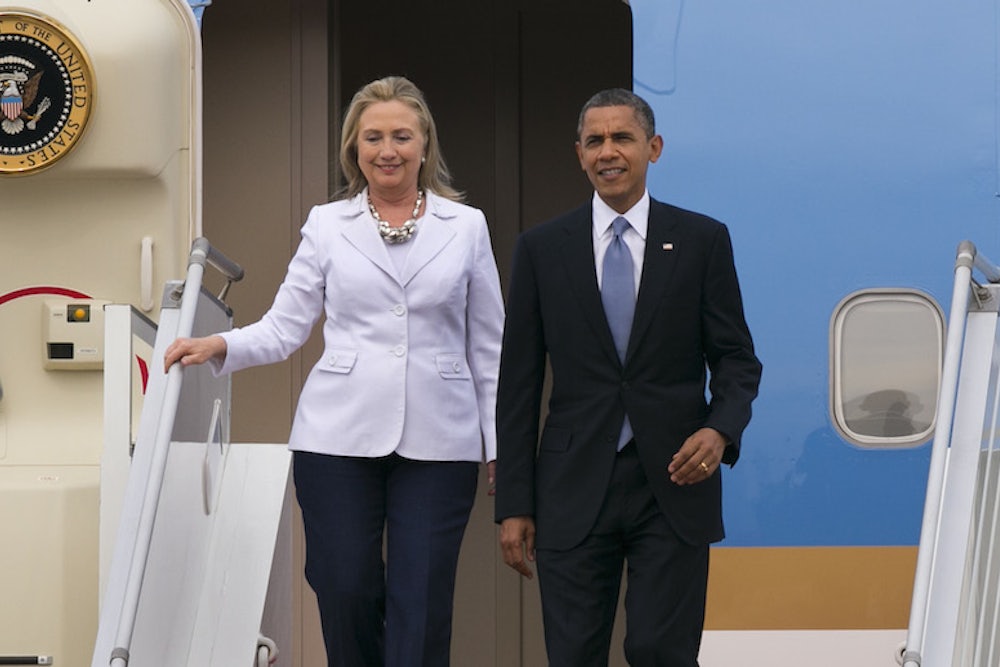The most important thing about Hillary Clinton’s interview with The Atlantic’s Jeffrey Goldberg might not be what it told us about Clinton herself, or the nature of her expected presidential candidacy, but about the political media and how it’s coping with the absence of a clearly contested Democratic primary.
The transcript has become a Rorschach test for the political press. How they interpret it probably says more about their perceptions of Hillary Clinton—whether based on years of reporting, or lazy caricatures—than about Clinton herself. Generally these interpretations fit into one of two different binary frames. Goldberg’s Atlantic colleague James Fallows bisected one of those frames here. By one reading of the transcript, Hillary didn’t mean to emphasize her disagreements with President Obama over national security policy, and his Syria policy in particular, and was simply slow to set the record straight. By another she knew exactly what she was doing, and is belatedly downplaying these differences pro forma, knowing that the damage she intended to do is done.
Then there’s the substantive dichotomy: Either Hillary was expressing her long-held, well-understood interventionist views, which have always been to the right of Obama’s, or she was positioning—trying to separate herself from him in any way possible—in which case the interview tells us nothing at all about how she might conduct U.S. foreign policy.
So there’s some ambiguity here. What’s unambiguous though, is that the absence of a natural Hillary rival has left the press desperate to set off unexploded differences between her and Obama, and that they will treat her every utterance about Obama’s record as a condemnation if they can.
But I think they’re going to be pretty disappointed in the end.
In the Goldberg interview, I saw a (likely) candidate acting intentionally but consistently. Surely she wants to play up some of her differences with Obama, and will play them up more aggressively in the future. There are pitfalls to this instinct. But there’s also a real difference here, and there always has been. I don’t think she’ll say Obama proved unprepared for that 3 a.m. phone call, but she’s always believed, and still believes that he should’ve answered it with more aggressive instincts.
Unfortunately for the press, that’s just about the whole story.
As it turns out, we have a pretty detailed roadmap of the Obama and Clinton worldviews—showing where they overlap and where they depart from each other—in the form of a very well documented 2008 primary campaign.
One of the most remarkable things about that campaign was the overwhelming consensus among all of the top contenders on all key domestic policy issues. The lone, major exception to the consensus was then-Senator Obama's refusal to include an individual mandate in his national health care plan. He took a lot of guff from Clinton and John Edwards and health policy wonks for his position, but it made his plan easier to sell to the public, and perhaps was a smart way to tee off negotiations with the industry. The evolution of the Affordable Care Act, from Obama’s blueprint in the primary, through passage of the law, is thus a story of Obama “evolving” toward Hillary's position, and eventually adopting it wholesale. I think Obama’s original reluctance was a bit trumped up and cynical. But that's what happened.
If once in office, Obama had departed further from the primary consensus, and enacted a series of policies at odds with, or far short of, those he’d campaigned on, then we’d have a recipe for renewed Obama-Clinton warfare. Instead, the opposite is true. And as such I think there's almost no reason to think Hillary will run away from Obama’s domestic record, or do damage to any of his accomplishments—particularly Obamacare—as a campaigner. She hasn't said much about ACA as a proto-candidate, but everything she's said has been consistent with the kinds of things you'd expect from a successor looking to shore up her predecessor's legacy. A great start, as good as we could have done with the constraints we faced, now we should strengthen it.
Unfortunately, that doesn’t leave much material for the confrontation-obsessed. Saying that health care and Wall Street should be improved and strengthened isn’t a great departure. Saying the steps Obama took through executive action—particularly his greenhouse gas and immigration policies—should be replaced by new statutes isn’t much of a knock on his policies. I can imagine her attributing Obama’s inability to squeeze climate change and immigration reform bills out of Congress to his unwillingness or inability to use the tools of political tradecraft—hardball negotiating, political networking—that she specializes in. But that’ll just be a calculated way of saying that she’s the person best suited to shore up and build upon his legacy.
Foreign policy will be the only substantive source of dissonance. I’m just not sure that’ll be enough to satisfy the people covering her.
